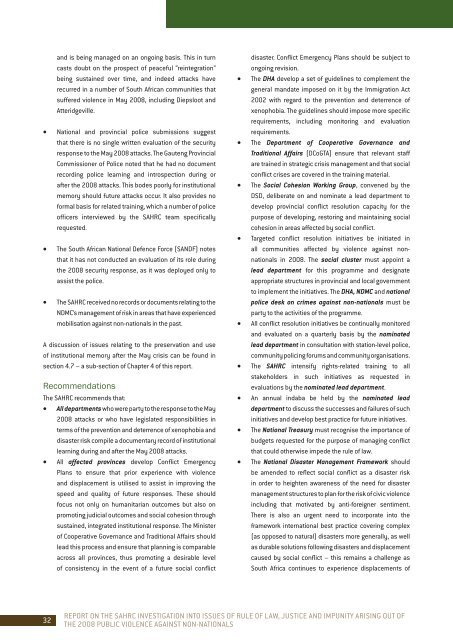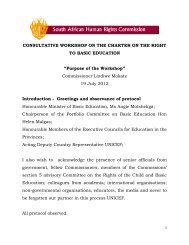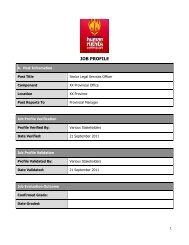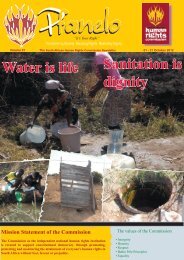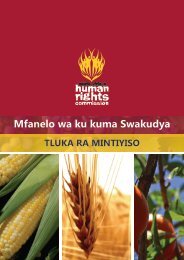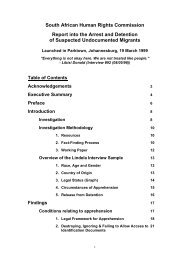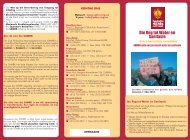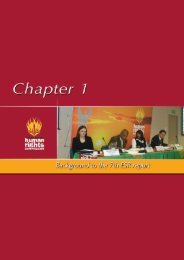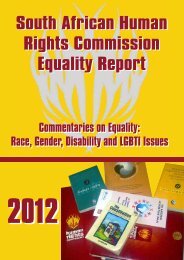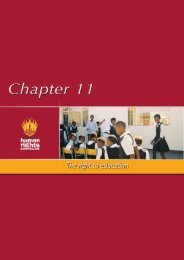Chapter 1 - South African Human Rights Commission
Chapter 1 - South African Human Rights Commission
Chapter 1 - South African Human Rights Commission
Create successful ePaper yourself
Turn your PDF publications into a flip-book with our unique Google optimized e-Paper software.
and is being managed on an ongoing basis. This in turn<br />
casts doubt on the prospect of peaceful “reintegration”<br />
being sustained over time, and indeed attacks have<br />
recurred in a number of <strong>South</strong> <strong>African</strong> communities that<br />
suffered violence in May 2008, including Diepsloot and<br />
Atteridgeville.<br />
• National and provincial police submissions suggest<br />
that there is no single written evaluation of the security<br />
response to the May 2008 attacks. The Gauteng Provincial<br />
<strong>Commission</strong>er of Police noted that he had no document<br />
recording police learning and introspection during or<br />
after the 2008 attacks. This bodes poorly for institutional<br />
memory should future attacks occur. It also provides no<br />
formal basis for related training, which a number of police<br />
officers interviewed by the SAHRC team specifically<br />
requested.<br />
• The <strong>South</strong> <strong>African</strong> National Defence Force (SANDF) notes<br />
that it has not conducted an evaluation of its role during<br />
the 2008 security response, as it was deployed only to<br />
assist the police.<br />
• The SAHRC received no records or documents relating to the<br />
NDMC’s management of risk in areas that have experienced<br />
mobilisation against non-nationals in the past.<br />
A discussion of issues relating to the preservation and use<br />
of institutional memory after the May crisis can be found in<br />
section 4.7 – a sub-section of <strong>Chapter</strong> 4 of this report.<br />
Recommendations<br />
The SAHRC recommends that:<br />
• All departments who were party to the response to the May<br />
2008 attacks or who have legislated responsibilities in<br />
terms of the prevention and deterrence of xenophobia and<br />
disaster risk compile a documentary record of institutional<br />
learning during and after the May 2008 attacks.<br />
• All affected provinces develop Conflict Emergency<br />
Plans to ensure that prior experience with violence<br />
and displacement is utilised to assist in improving the<br />
speed and quality of future responses. These should<br />
focus not only on humanitarian outcomes but also on<br />
promoting judicial outcomes and social cohesion through<br />
sustained, integrated institutional response. The Minister<br />
of Cooperative Governance and Traditional Affairs should<br />
lead this process and ensure that planning is comparable<br />
across all provinces, thus promoting a desirable level<br />
of consistency in the event of a future social conflict<br />
disaster. Conflict Emergency Plans should be subject to<br />
ongoing revision.<br />
• The DHA develop a set of guidelines to complement the<br />
general mandate imposed on it by the Immigration Act<br />
2002 with regard to the prevention and deterrence of<br />
xenophobia. The guidelines should impose more specific<br />
requirements, including monitoring and evaluation<br />
requirements.<br />
• The Department of Cooperative Governance and<br />
Traditional Affairs (DCoGTA) ensure that relevant staff<br />
are trained in strategic crisis management and that social<br />
conflict crises are covered in the training material.<br />
• The Social Cohesion Working Group, convened by the<br />
DSD, deliberate on and nominate a lead department to<br />
develop provincial conflict resolution capacity for the<br />
purpose of developing, restoring and maintaining social<br />
cohesion in areas affected by social conflict.<br />
• Targeted conflict resolution initiatives be initiated in<br />
all communities affected by violence against nonnationals<br />
in 2008. The social cluster must appoint a<br />
lead department for this programme and designate<br />
appropriate structures in provincial and local government<br />
to implement the initiatives. The DHA, NDMC and national<br />
police desk on crimes against non-nationals must be<br />
party to the activities of the programme.<br />
• All conflict resolution initiatives be continually monitored<br />
and evaluated on a quarterly basis by the nominated<br />
lead department in consultation with station-level police,<br />
community policing forums and community organisations.<br />
• The SAHRC intensify rights-related training to all<br />
stakeholders in such initiatives as requested in<br />
evaluations by the nominated lead department.<br />
• An annual indaba be held by the nominated lead<br />
department to discuss the successes and failures of such<br />
initiatives and develop best practice for future initiatives.<br />
• The National Treasury must recognise the importance of<br />
budgets requested for the purpose of managing conflict<br />
that could otherwise impede the rule of law.<br />
• The National Disaster Management Framework should<br />
be amended to reflect social conflict as a disaster risk<br />
in order to heighten awareness of the need for disaster<br />
management structures to plan for the risk of civic violence<br />
including that motivated by anti-foreigner sentiment.<br />
There is also an urgent need to incorporate into the<br />
framework international best practice covering complex<br />
(as opposed to natural) disasters more generally, as well<br />
as durable solutions following disasters and displacement<br />
caused by social conflict – this remains a challenge as<br />
<strong>South</strong> Africa continues to experience displacements of<br />
32<br />
REPORT ON THE SAHRC INVESTIGATION INTO ISSUES OF RULE OF LAW, JUSTICE AND IMPUNITY ARISING OUT OF<br />
THE 2008 PUBLIC VIOLENCE AGAINST NON-NATIONALS


